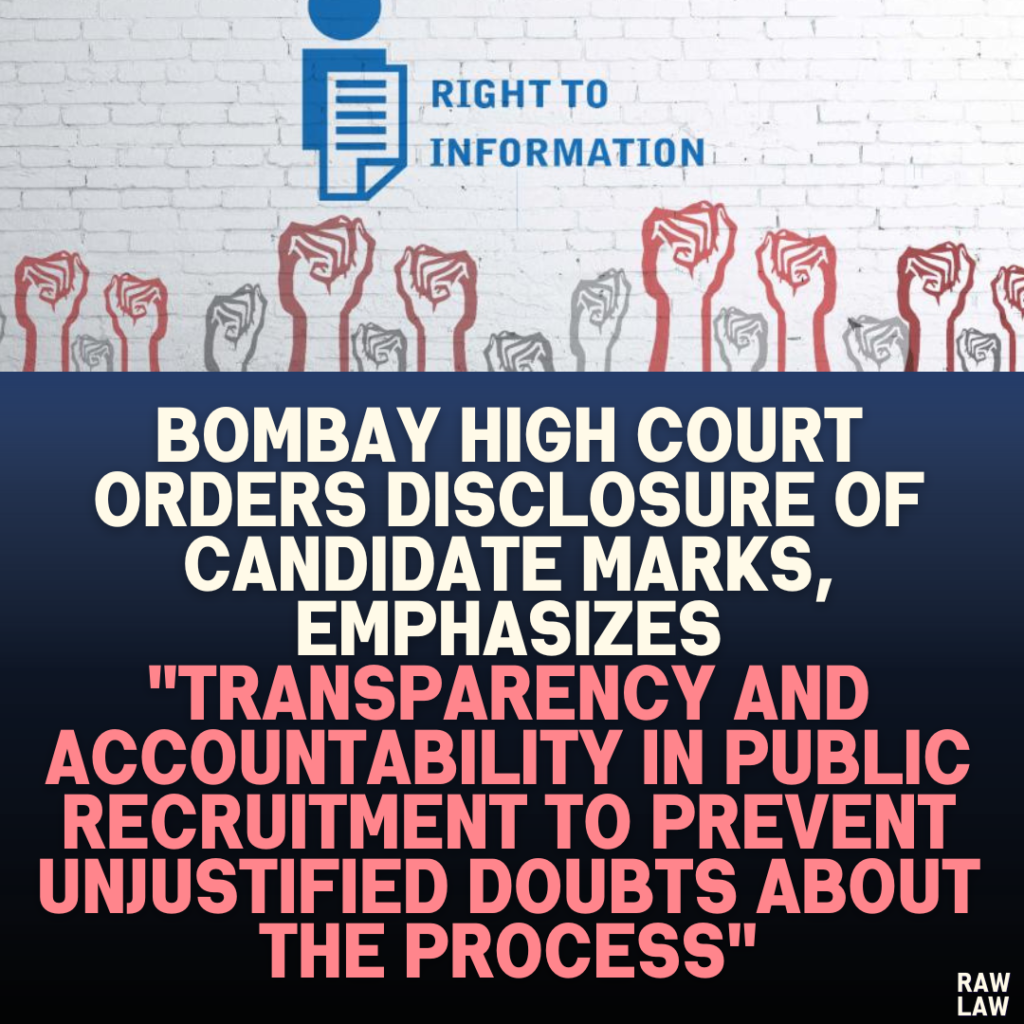Court’s Decision:
The Bombay High Court directed the Public Information Officer (PIO) and other respondents to disclose the marks obtained by the petitioner and other candidates ranked from 1 to 363 in the written test, Marathi and English typing tests, and interview for Junior Clerk recruitment at the Pune District Court. The Court held that such information does not constitute confidential or exempt information under the Right to Information Act (RTI) and highlighted the importance of transparency and accountability in public recruitment. The respondents were given six weeks to furnish the information upon the petitioner’s payment of necessary costs.
Facts:
The petitioner applied for a Junior Clerk position at the Pune District Court and participated in the recruitment process, including a Marathi and English typing test and an interview. After discovering his non-selection, he filed a request under the RTI Act, seeking details of his scores and those of other candidates, as well as the selection criteria. The PIO denied the information based on Rule 13(e) of the Maharashtra District Courts Right to Information (Revised Rules), 2009, citing confidentiality. The petitioner appealed, but both the First Appellate Authority and the State Information Commissioner upheld the denial, leading the petitioner to file this writ petition.
Issues:
- Whether the denial of candidate marks under Rule 13(e) and Sections 8(1)(j) and 11 of the RTI Act is valid.
- Whether transparency in a public recruitment process justifies the disclosure of scores obtained by candidates.
Petitioner’s Arguments:
The petitioner contended that disclosure of the marks of all candidates would promote transparency and was essential for assessing his position relative to other candidates. He argued that the Pune District Court’s recruitment process should be as transparent as a similar process at the District Court in Wardha, where such marks were disclosed publicly.
Respondent’s Arguments:
The respondents, represented by Mr. Datar, argued that the information requested was exempt under Sections 8(1)(j) and 11 of the RTI Act, as it constituted third-party and personal information. They asserted that public recruitment involved confidentiality in scoring and selection criteria and that disclosure would breach other candidates’ privacy rights.
Analysis of the Law:
The Court examined Section 8(1)(j) of the RTI Act, which exempts information that constitutes personal data without a public interest. However, it clarified that personal information related to public activity, such as a recruitment process, could be disclosed if it served a larger public interest. The Court referenced Central Public Information Officer, Supreme Court of India v. Subhash Chandra Agarwal and Tej Prakash Pathak v. Rajasthan High Court, noting that transparency is a core principle of public administration and selection processes, which must remain open to avoid unwarranted suspicions.
Precedent Analysis:
The Court drew upon Institute of Chartered Accountants of India v. Shaunak H. Sarya and CBSE v. Aditya Bandopadhyay, emphasizing that public interest in accountability outweighs the privacy of candidates in recruitment processes. Additionally, Chief Information Commissioner v. High Court of Gujarat was cited to argue that personal information disclosure in administrative processes related to public functions is permissible if it serves a larger public interest.
Court’s Reasoning:
The Court concluded that the selection process for a public position is inherently a public activity and that candidates’ marks are not private data unrelated to public interest. It emphasized that transparency in recruitment fosters public confidence in administrative procedures and that withholding such information might give rise to unjustified doubts about the process.
Conclusion:
The Court partially allowed the petition, setting aside the orders that denied disclosure of candidate marks. It instructed the respondents to provide the requested information within six weeks.
Implications:
This judgment strengthens the principle that public recruitment processes must be transparent, supporting the RTI Act’s goal of accountability in government operations. It underscores that candidate marks in public recruitment are not inherently confidential and that disclosure serves a vital public interest, setting a precedent for openness in similar processes across public institutions.




Pingback: Supreme Court Bars Punitive Demolitions Without Judicial Approval, Emphasizes Due Process to Prevent "Police State" and Issues Guidelines Against Arbitrary State Actions - Raw Law